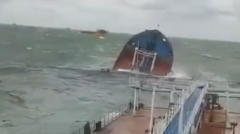Two Russian oil tankers have sustained severe damage in the Black Sea, resulting in an oil spill and a dangerous rescue mission. Footage from the Southern Transport Prosecutor's Office revealed one tanker dramatically split in two, with visible oil streaks on the water's surface. The incident occurred in the Kerch Strait, a vital passage separating Russia from Crimea, which remains a contentious territory following its illegal annexation by Moscow in 2014. Authorities reported that at least one crew member died when the vessels drifted aground.
Russian Tankers Meet Calamity in Black Sea: Oil Spill and Dramatic Rescue Operations

Russian Tankers Meet Calamity in Black Sea: Oil Spill and Dramatic Rescue Operations
Two Russian oil tankers suffered catastrophic damage in the Black Sea, resulting in an oil spill and prompting ongoing rescue efforts.
Rescue efforts involving tugboats, helicopters, and over 50 emergency personnel managed to evacuate 13 crew members from the more severely damaged tanker. However, the operation was suspended due to hazardous weather conditions. Meanwhile, the remaining 14 crew members on the second vessel are reportedly safe but stranded, having adequate provisions for survival until the weather improves. In response to the crisis, President Vladimir Putin established a working group led by Deputy Prime Minister Vitaly Savelyev to address the fallout from the incident, while investigations into potential criminal negligence are underway.
Analyst Michelle Bockmann from Lloyd's List noted that the tankers, owned by Volgatanker, were small, each carrying approximately 4,300 deadweight tonnes of oil—far less than a typical crude oil tanker, which can hold around 120,000 deadweight tonnes. This suggests they were likely used for transport on Russia's inland waterways. The Kerch Strait is also crucial for grain export channels and the transport of various energy resources.
Historically, the region has seen similar tragedies; in 2007, the tanker Volgoneft-139 split during a storm, spilling over 1,000 tonnes of oil. Following the Kremlin's full-scale invasion of Ukraine in early 2022, Russian oil imports have faced heavy sanctions from Ukraine's allies. Allegations have arisen regarding Russia's use of a “ghost fleet” to evade these restrictions, though Bockmann indicated the vessels involved in this latest incident do not appear to be part of that fleet.
For further information on the incident and its implications for Russian energy exports, follow our updates.
Analyst Michelle Bockmann from Lloyd's List noted that the tankers, owned by Volgatanker, were small, each carrying approximately 4,300 deadweight tonnes of oil—far less than a typical crude oil tanker, which can hold around 120,000 deadweight tonnes. This suggests they were likely used for transport on Russia's inland waterways. The Kerch Strait is also crucial for grain export channels and the transport of various energy resources.
Historically, the region has seen similar tragedies; in 2007, the tanker Volgoneft-139 split during a storm, spilling over 1,000 tonnes of oil. Following the Kremlin's full-scale invasion of Ukraine in early 2022, Russian oil imports have faced heavy sanctions from Ukraine's allies. Allegations have arisen regarding Russia's use of a “ghost fleet” to evade these restrictions, though Bockmann indicated the vessels involved in this latest incident do not appear to be part of that fleet.
For further information on the incident and its implications for Russian energy exports, follow our updates.




















